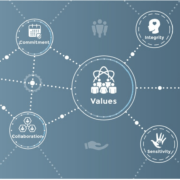How Outsourced Accounting Supports Non-Profit Annual Audits
The regulations a nonprofit organization must adhere to can be daunting. Even the most robust accounting department is intimidated by the looming specter of an audit. In the world of nonprofits, where keeping operational costs low is a priority in service of the greater good, and accounting departments are often running very lean, audits can be extremely taxing on an internal accounting department.
At Signature Analytics, we pride ourselves on the work we do supporting midsized and larger non-profit organizations across the country. We have deep expertise in the financial statement preparation necessary for nonprofits to successfully pass their annual audit.
There are a number of situations in which outsourced services and their inherent flexibility can be of particular service. For example, if your nonprofit has had a sudden influx of donations, if your organization has grown rapidly, or if you have lost key people, or had to scale down quickly, access to flexible outsourced accounting services with an expertise in the world of nonprofits might be the right solution for your organization.
There are major areas of vulnerability for a nonprofit including
- Outdated technology which leads to manual and time-consuming processes
- Lack of internal controls that can cause discrepancies in financial statements
- No single source of truth for financial data
- Vacant finance and accounting leadership roles
Passing an annual audit is essential to the longevity of your mission and to the impact you can create. At Signature Analytics, we are dedicated to supporting nonprofits as they navigate upgrades to their technology and improvements to their financial management because we know that with better financial management, your mission can thrive.
What are the requirements for a nonprofit to pass its annual financial statement audit?
In order to pass their annual financial statement audit, a nonprofit must provide evidence that their financial statements are accurate and meet the standards set forth by Generally Accepted Accounting Principles (GAAP). This includes providing a full and complete set of financial statements, including a statement of financial position (balance sheet), statement of activities (income statement), statement of cash flows, statement of changes in net assets, and statement of functional expenses. The nonprofit must also provide supporting documentation, including general ledger accounts, contracts, bank statements, and other records. Additionally, the nonprofit must be able to demonstrate that they have internal controls in place to properly mitigate risk and that they are in compliance with all applicable laws and regulations.
What are the challenges nonprofits face in preparing for their annual financial statement audits?
Nonprofits face a variety of challenges in preparing for their annual financial statement audits. These include: ensuring they have accurate financial records that are prepared in accordance with Generally Accepted Accounting Principles (GAAP), collecting and organizing the necessary supporting documentation, and having the necessary internal controls in place to properly mitigate risk and ensure compliance with all applicable laws and regulations. Additionally, nonprofits must ensure that they are able to provide evidence to support the accuracy of their financial statements and adequately address any discrepancies or irregularities that may be found during the audit process. Finally, nonprofits must ensure that they have the necessary resources and personnel available to conduct the audit in an accurate and timely manner.
Nonprofits are often understaffed in an attempt to keep administrative costs low for their 990 reporting. This can lead to high stress or burnout. On top of the constraints of staffing, technology is notoriously lagging in nonprofits making processes time-consuming and manual. Under these circumstances, it is not surprising that accounting staff struggle to meet the expectations of an increasingly sophisticated and demanding Board of Directors.
Audits can strain an internal accounting department by requesting specific reporting and 990 preparation expertise. Using an outsourced partner can help by improving internal controls, standardizing and documenting processes and recommending technologies to improve manual processes.
Who can prepare financial statements for a nonprofit financial statement audit?
A CPA has to audit the financials for a nonprofit financial statement audit however, that CPA cannot prepare the statements being audited as that would be a conflict of interest. The financial statements including the Statement of Activities, Statement of Financial Position, and all related financial reporting must be prepared by a separate entity and presented to the auditing CPA for their review. Often, nonprofits think they can take on this task of financial statement preparation but do not realize the intense scrutiny that their financials undergo in the audit process.
What are some of the requested amendments that Financial Statement Audits return?
- Unrecorded Liabilities: Auditors may identify unrecorded liabilities that should be recognized in the financial statements.
- Unrecorded Assets: Auditors may identify unrecorded assets that should be recognized in the financial statements.
- Off-Balance Sheet Obligations: Auditors may identify potential off-balance sheet obligations that should be disclosed.
- Improper Accounting Treatment: Auditors may identify improper accounting treatments and suggest appropriate changes.
- Misclassification of Expenses: Auditors may identify misclassifications of expenses, suggesting changes to ensure accuracy.
- Unsupported Transactions: Auditors may identify unsupported transactions, suggesting appropriate support documentation.
- Uncorrected Errors: Auditors may identify errors that have not been corrected, suggesting changes to ensure accuracy.
What are the consequences of failing a financial statement audit?
The consequences of a failed financial statement audit for a nonprofit can be serious. It could lead to a loss of funding or donations, increased scrutiny from regulators, or even criminal charges. It could also lead to a loss of public trust and confidence, which could be difficult to regain. Additionally, the organization’s reputation may suffer, leading to fewer volunteers and donors. Lastly, it could lead to the organization being unable to obtain financing or loans or losing its 501c3 status.
Watchdog organizations keep careful tabs on the results of annual audits and report the results. The advantage to this is that when you pass your audit and get excellent reports those reports are published, helping guide donors to your nonprofit.
What updates or new requirements must Nonprofits comply with in 2023?
New Pronouncement requirements from FASB are a constant source of accounting department stress. The requirements can easily creep up on a nonprofit. Many NFP accounting teams don’t know how to implement these requirements but they are a required part of GAAP. One example is ASC 842 for Leases:
FASB ASC Topic 842, Leases is a new accounting standard that requires organizations to recognize leases on their balance sheets. This means that nonprofit accounting departments will need to identify all leases they have entered into and determine whether they meet the definition of a lease under the new standard. If they do, the nonprofit must record the lease liability and right-of-use asset on their balance sheet, and also disclose additional information in their financial statements. This will impact how nonprofits report on their financial statements and require additional processes and controls to ensure proper tracking and reporting of leases. Nonprofit accounting departments will need to ensure they have the proper systems and processes in place to comply with the new standard and accurately report their lease obligations.
There are several other FASB (Financial Accounting Standards Board) Pronouncements that have specific (and often challenging) requirements for nonprofits. Some of the key pronouncements include:
FASB ASU 2020-07, Not-for-Profit Entities (Topic 958): Presentation and Disclosures by Not-for-Profit Entities for Contributed Nonfinancial Assets. The Update is expected to increase transparency around contributed nonfinancial assets (also known as “gifts-in-kind”) received by not-for-profit (NFP) organizations, including transparency on how those assets are used and how they are valued. These amendments should be applied on a retrospective basis and are effective for annual periods beginning after June 15, 2021, and interim periods with annual periods beginning after June 15, 2022.
FASB ASU 2016-14, Not-for-Profit Entities (Topic 958): Presentation of Financial Statements of Not-for-Profit Entities: This pronouncement provides guidance on how nonprofit organizations should present their financial statements, including new reporting requirements related to net asset classifications, liquidity, functional expenses, and investment returns.
FASB ASU 2018-08, Not-for-Profit Entities (Topic 958): Clarifying the Scope and the Accounting Guidance for Contributions Received and Contributions Made: This standard provides updated guidance on how nonprofits should account for contributions they receive and contributions they make. It clarifies the definition of a contribution, provides guidance on how to distinguish between contributions and exchange transactions, and provides additional guidance on how to account for conditional contributions.
FASB ASU 2014-09, Revenue from Contracts with Customers (Topic 606): This standard outlines the requirements for how nonprofits should recognize revenue from contracts with customers. It establishes a five-step process for revenue recognition, including identifying the contract, identifying the performance obligations, determining the transaction price, allocating the transaction price, and recognizing revenue as the performance obligations are fulfilled. NFPs regularly make errors implementing ASC 606. For example, many NFPs record grant revenue when the cash is received instead of upon award.
FASB ASU 2016-02, Leases (Topic 842): This standard, as mentioned above, requires organizations to recognize leases on their balance sheets. Nonprofits are required to comply with this standard just like any other organization.
These pronouncements all have significant impacts on nonprofit accounting departments and require careful consideration and planning to ensure compliance. Nonprofits need to understand the implications of these pronouncements on their organization. Here at Signature Analytics, we recognize the additional burden these new pronouncements place on an already stretched accounting team and we are here to help.
How does Signature Analytics help nonprofits in audit preparation, day-to-day accounting, and beyond?
We partner with nonprofits and act as a member of the internal team. It is our privilege to serve our nonprofit clients and support their missions by providing the kind of accurate and trustworthy reporting that gives their Boards of Directors confidence in the way the organization is being run. Our long history with nonprofits speaks to the commitment we have and the relationships we build with our NFP partners.
We build Standard Operating Procedures for everything we do so that you have visibility into the processes that make your accounting work. We have the depth of expertise and financial sophistication to address all levels of concerns from a savvy Board of Directors. Our reporting is clear and precise, supporting your requirements around 990 preparation and Financial Statement Audits so you have the reliable financial information to proceed seamlessly through those requirements. We support your grant preparation, writing, and reporting by providing accurate and timely financial information.
Because of our commitment to the success of each of our non-profit clients, we support many nonprofits beyond financial statement audits. In fact, we regularly engage with our NFP clients for ongoing day-to-day accounting support after our initial audit help. We take the stress out of nonprofit accounting across California and across the US.
If your nonprofit is falling behind on audits, if your Board is requesting a level of reporting that is causing your in-house accounting staff to be burned out or over-stressed, if you need accurate financials to make smart decisions… Please reach out. We are here to support your mission with reliable outsourced accounting support.











